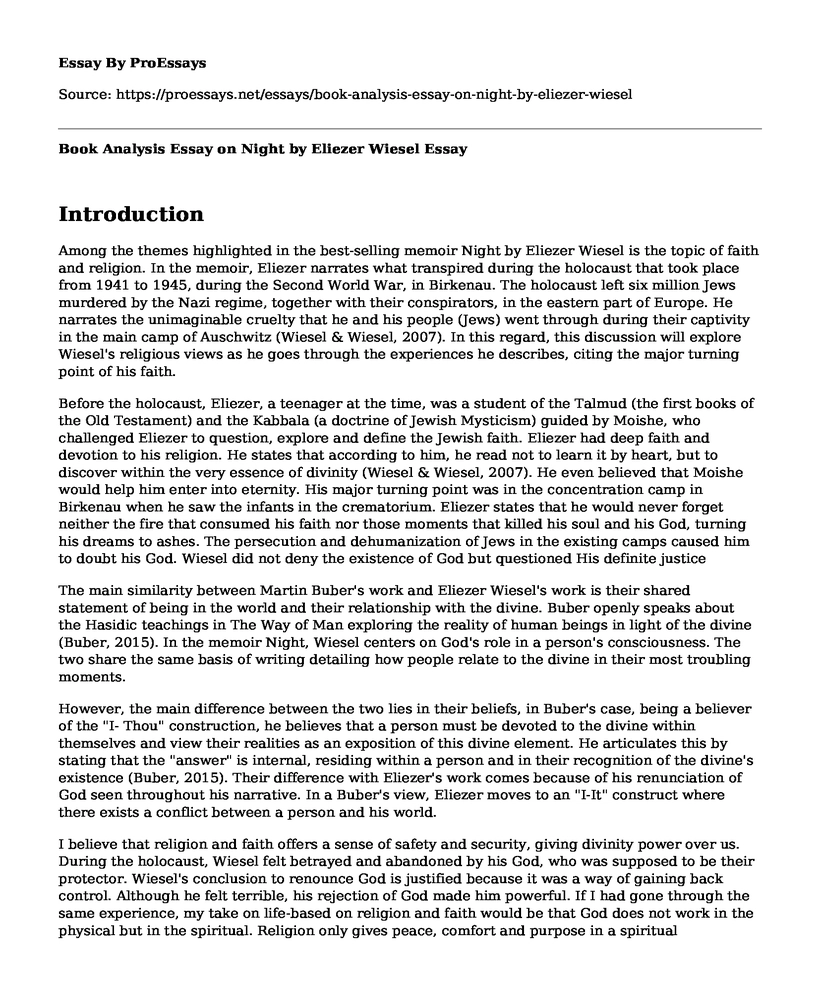Introduction
Among the themes highlighted in the best-selling memoir Night by Eliezer Wiesel is the topic of faith and religion. In the memoir, Eliezer narrates what transpired during the holocaust that took place from 1941 to 1945, during the Second World War, in Birkenau. The holocaust left six million Jews murdered by the Nazi regime, together with their conspirators, in the eastern part of Europe. He narrates the unimaginable cruelty that he and his people (Jews) went through during their captivity in the main camp of Auschwitz (Wiesel & Wiesel, 2007). In this regard, this discussion will explore Wiesel's religious views as he goes through the experiences he describes, citing the major turning point of his faith.
Before the holocaust, Eliezer, a teenager at the time, was a student of the Talmud (the first books of the Old Testament) and the Kabbala (a doctrine of Jewish Mysticism) guided by Moishe, who challenged Eliezer to question, explore and define the Jewish faith. Eliezer had deep faith and devotion to his religion. He states that according to him, he read not to learn it by heart, but to discover within the very essence of divinity (Wiesel & Wiesel, 2007). He even believed that Moishe would help him enter into eternity. His major turning point was in the concentration camp in Birkenau when he saw the infants in the crematorium. Eliezer states that he would never forget neither the fire that consumed his faith nor those moments that killed his soul and his God, turning his dreams to ashes. The persecution and dehumanization of Jews in the existing camps caused him to doubt his God. Wiesel did not deny the existence of God but questioned His definite justice
The main similarity between Martin Buber's work and Eliezer Wiesel's work is their shared statement of being in the world and their relationship with the divine. Buber openly speaks about the Hasidic teachings in The Way of Man exploring the reality of human beings in light of the divine (Buber, 2015). In the memoir Night, Wiesel centers on God's role in a person's consciousness. The two share the same basis of writing detailing how people relate to the divine in their most troubling moments.
However, the main difference between the two lies in their beliefs, in Buber's case, being a believer of the "I- Thou" construction, he believes that a person must be devoted to the divine within themselves and view their realities as an exposition of this divine element. He articulates this by stating that the "answer" is internal, residing within a person and in their recognition of the divine's existence (Buber, 2015). Their difference with Eliezer's work comes because of his renunciation of God seen throughout his narrative. In a Buber's view, Eliezer moves to an "I-It" construct where there exists a conflict between a person and his world.
I believe that religion and faith offers a sense of safety and security, giving divinity power over us. During the holocaust, Wiesel felt betrayed and abandoned by his God, who was supposed to be their protector. Wiesel's conclusion to renounce God is justified because it was a way of gaining back control. Although he felt terrible, his rejection of God made him powerful. If I had gone through the same experience, my take on life-based on religion and faith would be that God does not work in the physical but in the spiritual. Religion only gives peace, comfort and purpose in a spiritual perspective, regardless of the physical pain.
Reference
Buber, M. (2015). Hasidism and modern man. Princeton University Press. Retrieved from: https://books.google.co.ke/books?hl=en&lr=&id=PWyYDwAAQBAJ&oi=fnd&pg=PR9&dq=Martin+Buber%E2%80%99s+The+Way+of+Man+&ots=o56lx3H7_U&sig=SC7CBsMuZDDKbn8fZ_nB4C72Bc8&redir_esc=y#v=onepage&q=Martin%20Buber%E2%80%99s%20The%20Way%20of%20Man&f=false
Wiesel, E., & Wiesel, M. (2007). Night. Special Materials Services, Manitoba Education. Retrieved from: https://ddt.dev.tecknoquest.com/estore/files/samples/DDT_estore/SSS/sss0978920406s.pdf
Cite this page
Book Analysis Essay on Night by Eliezer Wiesel . (2023, Apr 12). Retrieved from https://proessays.net/essays/book-analysis-essay-on-night-by-eliezer-wiesel
If you are the original author of this essay and no longer wish to have it published on the ProEssays website, please click below to request its removal:
- Reflection on "The Tell-Tall Heart" by Edgar Allan Poe
- Essay Sample on Alejo Carpentier and His Work
- Creativity and Rationality in Charlotte Gilman's The Yellow Wallpaper - Literary Analysis Essay
- Brighton Beach Memoirs Essay Example
- Reaction to "Oedipus The King" Essay Example
- Essay Sample on John Bunyan: Tinker to Iconic Puritan Preacher & Writer
- Free Report Sample: Romanticism/Transcendentalism Questions







